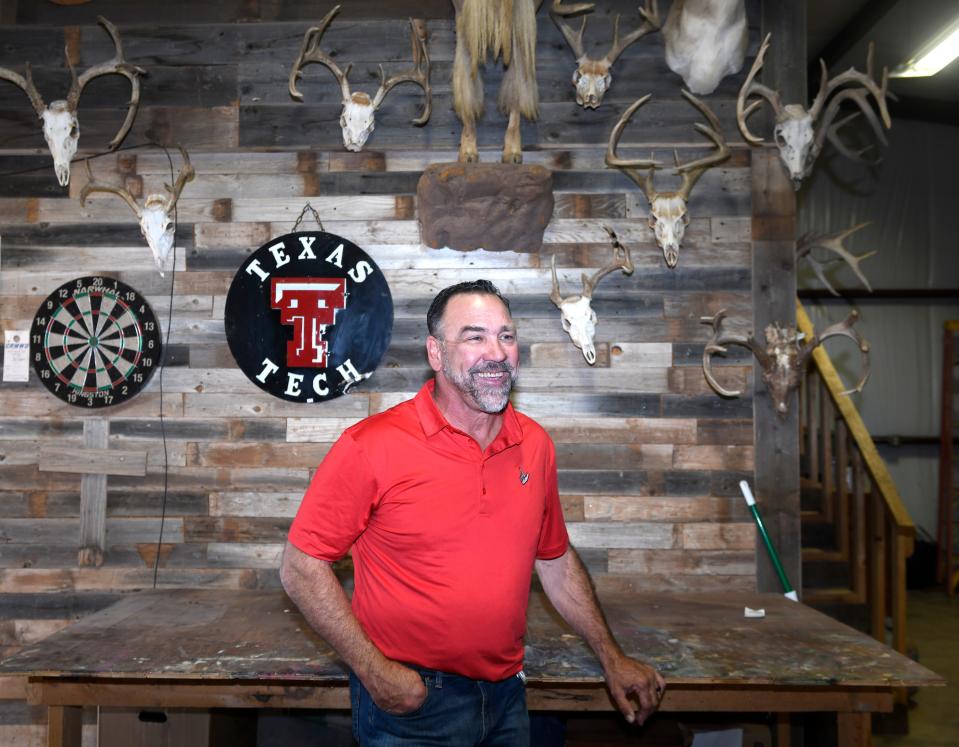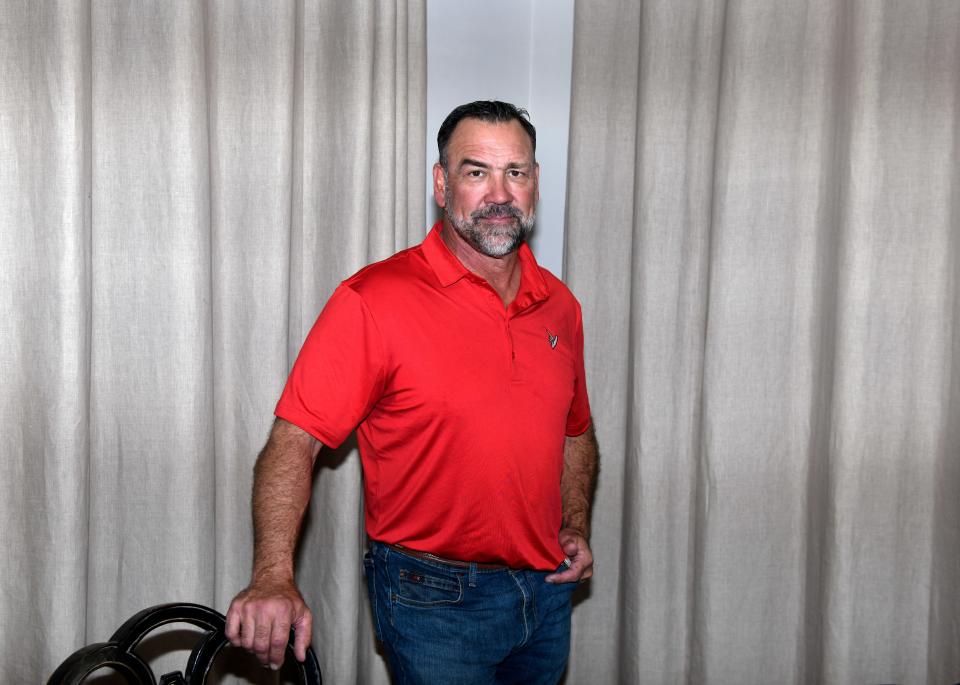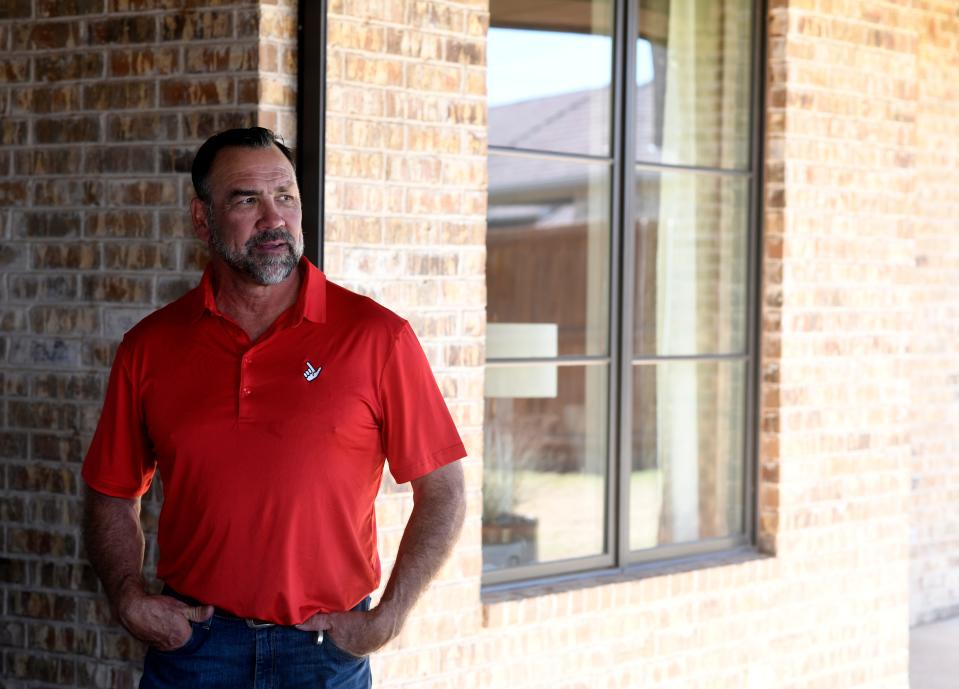Texas Tech football letterman Ben Kirkpatrick conquering cancer in life's hardest battle
In the 13 seasons Spike Dykes coached the Texas Tech football team, it would be hard to find someone who more closely fit the image of a Spike Dykes player than Ben Kirkpatrick.
He grew up on a ranch outside the small West Texas town of Post, right on the rugged edge of the Caprock. At 5-foot-11 and 220 pounds, he was undersized for linebacker, but undaunted. In high school, he rolled up enormous statistics as a do-it-all player on both offense and defense, being named Class 3A All-South Plains player of the year in 1987 and defensive player of the game for the North in the Texas High School Coaches Association All-Star Game.
The college football powers couldn't have shown less interest — Kilgore College and Abilene Christian and Lamar wanted him. As blue-chip linebackers one by one turned down Texas Tech in the winter of 1987-88, Dykes' staff eventually circled back to the kid from Post and upped its offer from walk-on to scholarship.
Kirkpatrick lettered all four years and became a starter with the Red Raiders, for whom his father Jack Kirkpatrick had been a star quarterback on the 11-win 1953 team. In the 1991 media guide, Tech publicists described Ben as "a bulldog type of player" and "a tough, hard-nosed player" and said he "overcomes lack of size by always playing hard."
"I think I was not the most talented person on the field, but mentally I thought I was," Kirkpatrick said recently. "Mentally, I thought I could go up against anybody. Did I have an attitude? Of course I had an attitude. I think most college football players have an attitude. Otherwise, they wouldn't be out there.
"You're not scared of anything. You think you're 9 foot tall and bulletproof." He grinned at the realization. "That sounds like something Spike would say."
Ben Kirkpatrick might have been beaten occasionally. He never believed he could be whipped.
Not until the spring of 2021 anyway. Cancer doesn't yield so easily to sports clichés.
Kirkpatrick remembers watching a March Madness game from an easy chair at the Joe Arrington Cancer Research and Treatment Center as a catheter poured chemotherapy drugs into his veins for the first time.
Life had humbled him before, but never like he was about to be.
"I wasn't on death's door," he said, "but mentally, there were several days there that I was just like, 'I think I would rather die than feel this way.' "
Watching a Texas Tech practice on a hot spring day earlier this year, Kirkpatrick put it another way: "You think you're tough," he told a reporter, juxtaposing the image of the stout Southwest Conference linebacker with that of the cancer patient. "You're not tough."

Column: Williams: Spike's players feel lasting influence
DeWitt Weaver years: Texas Tech Hall of Fame QB Johnson passes away at 80
A frightening diagnosis
Kirkpatrick went in for surgery in February 2021 at University Medical Center to remove what seemed to be a large, but not necessarily foreboding goiter. When Kirkpatrick woke up and emerged from the fog of anesthesia, his doctor delivered jarring news: It's not a goiter. It's cancer. The specific diagnosis: squamous cell carcinoma, stage 2.
From that point until May 2021, his oncologists administered three rounds of Cisplatin chemotherapy in a six-week period and 33 radiation treatments directed at the back of his head and neck.
"They said, 'You're young. You're healthy. We're going to hit you with everything we can,'" Kirkpatrick recalled.
Fast forward to better days: A patient needs to go five years after successful treatment, without recurrence, to be deemed cancer-free. Kirkpatrick has had clear scans for 2 1/2 years. He's busy as can be at work, in his longtime occupation as a farm-and-ranch realtor and with a new business he just started in mobile waste compaction. He's back up to 210 pounds from a cancer-treatment low of 173.
No one could even tell where the surgeon went into his neck along a wrinkle contour.
"You can't see the scar any longer. He did a good job," Kirkpatrick said. "But going through the chemo and radiation was probably the toughest thing I've ever had to do in my life. You go through life, and you know people that have cancer or you lose loved ones with cancer, and you pray for them, you feel sorry for them or whatever.
"But it doesn't really affect you until it's you, and you have to look in the mirror and go: I've got cancer. How are we going to handle this? Are we going to fight it? Are we going to lay down? What are we going to do?"
Today, Kirkpatrick can look back at photos from a family vacation and notice faint signs of the swelling beginning on the right side of his neck. By the time it was removed, the mass was similar in size to a softball, but elongated along his esophagus. With radiation treatments, Kirkpatrick was told, his odds of a good outcome were 92%. Layer on chemotherapy and the favorable odds increased to 96%.
Knowing he could win made the process no less miserable.
He was 52 years old and, former athlete that he is, still exercising daily at 5:30 a.m. before starting his work day.
"To be honest, I went in kind of, I guess, prideful," he said. "I go to the gym five days a week. I feel pretty good about my body. I still feel like I try to keep an athletic mentality.
"But I'm going to tell you, after about two chemos and 20 radiations, you feel like you'd rather die than do anything. It's just, the chemo's just horrible. Horrible."
The treatments scorched his throat. Unwilling to take a feeding tube, Kirkpatrick consumed high-calorie protein shakes, but the lactic acid in the milk-based drinks burned going down. Swallowing anything was an irritation. The residual effects went on for months and months.
That was another unpleasant surprise.
"You think you're going to bounce back," Kirkpatrick said, "but you don't. You don't bounce back at all."
As a side effect, Kirkpatrick lost 30% hearing in one ear.
Describing his ordeal on a recent fall day in the food court of a Lubbock supermarket, Kirkpatrick swigs frequently from a 1-liter bottle of water. He goes through about four a day. Going into treatment, he learned, the radiation could take his senses of taste and smell, as well as the function of his salivary glands. His taste and smell came back. His salivary glands conked out and haven't come back.
"So I dry out pretty bad," he said. "But if that's the worst that I have to go through, then I'm pretty thankful."

Jordan Kirkpatrick follows family legacy Red Raider roots
Third-generation Red Raider: Texas Tech snags Cooper's Jake Kirkpatrick
The silver lining
Ben Kirkpatrick glances into space and does a mental inventory of the names: Three people from Post, one from Tahoka, one from Southland, two or three more from elsewhere. Some are around 10 years older, others 10 years or thereabouts younger.
They're all people with whom he's come into contact or reconnected because of cancer, since he's been treated for cancer.
When others became aware of his health crisis, Kirkpatrick took heart from well wishes and recommendations. Now, as he sees it, it's his turn.
"It's changed my outlook on life," he said. "First of all, every morning I see the light of day, I know I'm blessed.
"If I can change another person's life by helping them through this process ... I've helped several men and women since then that I get wind of are going through something similar or some cancer. I call them my cancer peeps. I have all these people that I send texts to and send little prayers to, and I call 'em.
"So it's been kind of a cool ministry, if you will, even though I'm not a minister, but I feel like God has given me a second chance so I can help someone down the road, so I can pay it forward."
Days spent sitting in the Joe Arrington Center provided perspective. When feeling beaten down, Kirkpatrick reminded himself that he went into the battle young and strong. Not everyone he saw started with the same benefit.
"It almost became a point where it allowed me to quit focusing on me and my feelings," he said, "and start worrying about, 'I wonder if that person's going to make it?' 'I wonder if that person over there's going to make it?' When you look around a waiting room on a chemo floor, you're really not having a bad day at age 53 when you're looking at 83 and 89 and thinking, "Man, I think I'll make it through this, but I don't know if they will.'
"That was hard to take. It softens your heart for sure."
Kirkpatrick and his wife Tamara have three sons: Jake, a former Tech football walk-on under Kliff Kingsbury, and college-aged Jordan and Jackson. They all played at Lubbock-Cooper.
Tamara says the football player she married 25 years ago gets teary-eyed more these days than he would have not so long ago. Ben Kirkpatrick doesn't dispute it. Upon each parting with a family member, no matter how daily or routine, the 1992 winner of Texas Tech's E.J. Holub Double Tough Award tries to work in an "I love you."
On a recent November day, unseasonably warm and sunny, Jordan Kirkpatrick left his parents' house to head back to work after lunch. The father told the son he loved him.
For Ben Kirkpatrick, after beating back cancer, no moment seems too trivial. And day-to-day irritations seem less so.
"I don't have many bad days anymore," he said, "because I know what a bad day really is."

This article originally appeared on Lubbock Avalanche-Journal: Ben Kirkpatrick conquering cancer in life's hardest battle

